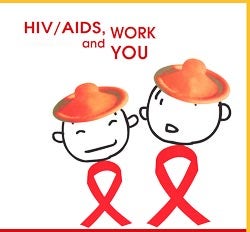Cũng có ở Tiếng Việt
Doing something useful for my country, Vietnam, always makes me happy. And I’ve tried to get this feeling through my work in developing the transport infrastructure network in Vietnam for over 10 years. Vietnam has come a long way, but there are still many related challenges ahead to make such development sustainable.
I still recall a conversation with a Bank’s specialist on HIV/AIDS a few years ago. We were discussing about the people who have recently availed of the Voluntary Counseling and Testing centers in the Mekong Delta region for HIV tests. She pointed out that they were mostly wives of construction workers employed in infrastructure projects. Sometime later I visited the construction sites and talked to the workers and their managers about the subject. I felt so worried, as their understanding on HIV/ AIDS was quite limited and wondered what could be done to protect this group of people from such a deadly disease?
Vietnam has made a great achievement in HIV/AIDS prevention, by keeping the prevalence rate at below 0.3% of its population. In Vietnam, we normally say “Phòng bệnh hơn chữa bệnh” (Better do Prevention rather than Cure). One of the most successful HIV/ AIDS prevention programs was to raise the awareness and understanding on HIV/ AIDS among vulnerable groups, such as sex workers and drug users.
Together with colleagues from AusAID, we designed a similar program targeting construction workers who are considered migrant people, as they have to frequently move from one construction site to another. Thus, the HIV/AIDS Awareness Raising and Prevention Program (HAPP) was born in early 2011 to enlighten workers employed in the Vietnam Mekong Delta Transport Infrastructure Development Project.
Implemented for 18 months, those who benefited from the program go beyond the construction workers themselves. Together with more than 1,200 workers and staff (equivalent to 50 per cent of people working under the project), about 3,200 local community members were trained on HIV/AIDS prevention. The series of trainings provided them with knowledge about the disease and taught them how to use condoms properly. People living with HIV/AIDS were also invited as educators to help people better understand the reality of the virus, and also in addressing negative attitudes related to stigma and discrimination.
 A sex worker who attended training told me that she would “try to persuade all customers to use condoms. I will tell them I am so afraid of being infected with HIV, that I want to avoid it and that I wish the same for them. They should also protect themselves and their families.”
A sex worker who attended training told me that she would “try to persuade all customers to use condoms. I will tell them I am so afraid of being infected with HIV, that I want to avoid it and that I wish the same for them. They should also protect themselves and their families.”
Results from the project show that 60 percent of attendees have got aware of risks of becoming HIV-positive or getting infected, compared to 10 percent before the training. Nearly 90 per cent of the attendees also felt comfortable eating with an HIV-positive person, compared to about 50 per cent before attending the training. The program also encouraged people to access voluntary counseling and testing services to find out their HIV status. The number of HIV testing cases has increased from around 30 percent to 70 percent. These are impressive results, aren’t they?
To sustain the program after the project is completed in 2012, 120 peer educators have received training for trainers. They now can share the knowledge to their fellow workers and to the community. Mr. Le Phuoc Lai, a volunteer educator shared with us that “this is not an easy task but I'm very happy to do it as I feel I’m doing something useful for my colleagues and I also feel confident to protect myself”.
Some 3,000 reader-friendly HIV/ AIDS manuals entitled “HIV/ AIDS, Work and You” containing important HIV/ AIDS information have also been printed and distributed to workers and local communities so they continue to read during leisure time.
I was so happy to see the results and listen to real stories from people benefiting from the program. In the future, my plan would be to replicate this approach to all other transport infrastructure projects in Vietnam to help construction workers protect themselves, protect their families and protect communities from the dreaded disease. I want to spread knowledge developed from this program in order to prevent HIV/ AIDS from spreading to the community.
This is for a Healthy Vietnam!

Join the Conversation